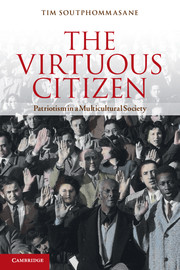9 - Conclusion
Published online by Cambridge University Press: 05 November 2012
Summary
In my introduction, I considered the case of Carl Schurz and his idea of ‘My country, right or wrong: if right, to be kept right; and if wrong, to be set right.’ It is an appealing encapsulation of what patriotism in a liberal polity should involve, particularly in light of the profound challenge that cultural diversity presents to ideas of citizenship and community. Demands by minority groups for the recognition of their cultural identities necessarily challenge a political community to reflect as much on its own values and practices as those of the minorities seeking recognition. This is undoubtedly one reason why a politics of multiculturalism can disrupt received understandings of national identity. If patriotic attachment to one's country is to mean anything, it must surely mean valuing certain merits and achievements of one's community as one's own. But how can one fulfil this requirement if one is impelled to value all cultural identities equally, as many understand multiculturalism to imply?
Answering this conundrum of ‘multiculturalism versus patriotism’ by appealing to a theory of liberal nationalism may strike some readers as an unlikely move, especially if the task for the liberal must be to reconcile the two values. After all, would not such an answer effectively side with patriotism over multiculturalism? Would it not imply that an assimilation of diverse identities into a national identity must take precedence over their recognition? The liberal nationalist is likely to respond by pointing out that any integrative dimension to national citizenship and community is not as unjust or oppressive as critics suggest. A national conversation, involving reflection on the content and character of a national culture, and conducted according to deliberative democracy, will allow diverse cultural identities to be expressed as part of a common national identity. In the terms I have used in this book, the public dialogue involved in a process of cultural recognition can be understood as a national-cultural dialogue open to claims of diversity. Yet there is a certain element of under-determination involved in this liberal nationalist argument. While a regulative ideal of deliberative democracy may be the most effective means of accommodating cultural difference, it does not necessarily explain (1) why a national public culture must involve a national-cultural dialogue based on self-interpretation among members of a nation; and (2) why this dialogue will be amenable to matters of cultural recognition. Liberal nationalism requires a critical elaboration explaining the conditions necessary for such a dialogue to be achieved.
- Type
- Chapter
- Information
- The Virtuous CitizenPatriotism in a Multicultural Society, pp. 229 - 233Publisher: Cambridge University PressPrint publication year: 2012



